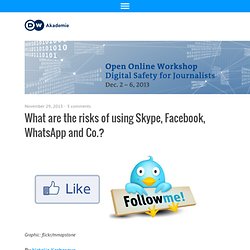

Why Information Security Matters in ICT4D - Technology Salon. The Technology Salon on Why Does Information Security Matter in International Development?

Was a predictably raucous debate on finding a sane balance between using 30-character passwords with symbols, numbers, and mixed-case letters that must be changed every month for your time sheet systems… and taking basic security measures to protect super-private data. Our two main questions were: How and where do we build in information security in ICT4D? When is it unwarranted, and when is it irresponsible to not address it?
There are the obvious cases, ones with a clear adversary – be it a repressive government or a group working aggressively against your goals. Be sure to sign up to get invited to future Salons. The problem is when there is no clear adversary – when no one actively hates your work. A false sense of security Project databases often contain the names and addresses of beneficiaries, who also happen to be private citizens. Social media: Weapon of PsyWar & you’re the target — RT Op-Edge. Secure your surfing with a Virtual Private Network (VPN) Photo: flickr/OER Africa One way journalists and activists get tracked online is through their computer’s IP address.

This is a very real threat – the Bahrain government for example has spied on the IPs of anonymous Twitter users to find out where they lived and imprisoned them for their comments. One highly effective method of making it impossible to trace you is by using Tor, which we’ve talked about in a previous post. Another way of staying anonymous online is through the use of a VPN (or Virtual Private Network). In this post, journalist Kyle James trials a VPN and discovers for himself the upsides and downsides of using one to protecting his privacy. Here in Cambodia, where I’m based, the wifi at home is usually OK – the key word here being “usually.” Sometimes my network decides to disappear for a few hours and if I need online access, I have to hightail it over to the café a block away that has a more dependable connection.
Sounds good, right? Getting virtually private. What’s your threat? Working out your security needs. Picture alliance / dpa Digital security is like most things – there’s no one-size-fits-all solution to making yourself safe.

The threats change depending on the story you’re working on, where you’re working and who you’re working with. To make it easier to determine your security needs, you need to ask yourself some questions about what your specific threats actually are. In other words, you need to do a threat model. Jonathan Stray, a professor at Columbia University’s Graduate School of Journalism, regularly teaches threat modeling to journalists and activists. » Online security: Best free tools to encrypt your data - Online Security - English - DW.DE. This is a continuation of our series exploring online security.

In the previous post, we looked at how to create and manage secure passwords. But what if your password was cracked and third parties gained access to your laptop, PC or USB drive? Don’t panic, the chances are still good that your data is safe – all you need to do is to encrypt and hide it in an invisible folder. In this post, DW Akademie’s Natalia Karbasova provides an overview of free tools to encrypt and hide sensitive data on your devices. How encryption works Let’s start with the basics. Encrypt your files and protect them with a password The easiest way to get started with encryption is to use a “file archiver” and data compression utility such as WinRAR or 7-zip. TrueCrypt TrueCrypt A more sophisticated way is to use open-source encryption software such as TrueCrypt.
To get started with the program, have a look at the beginner’s tutorial. AxCrypt AxCrypt Alternative encryption software Hide your data inside other files. What are the risks of using Skype, Facebook, WhatsApp and Co.? Graphic: flickr/mmapstone By Natalia Karbasova New technologies empower journalists and help them reach audiences all over the world.

Their words, pictures and sounds can be transmitted around the globe in a matter of seconds. Many reporters use Skype, WhatsApp, Facebook, Google Mail, Tumblr, Blogger, WordPress and Dropbox to communicate, store data, collaborate and promote their work.